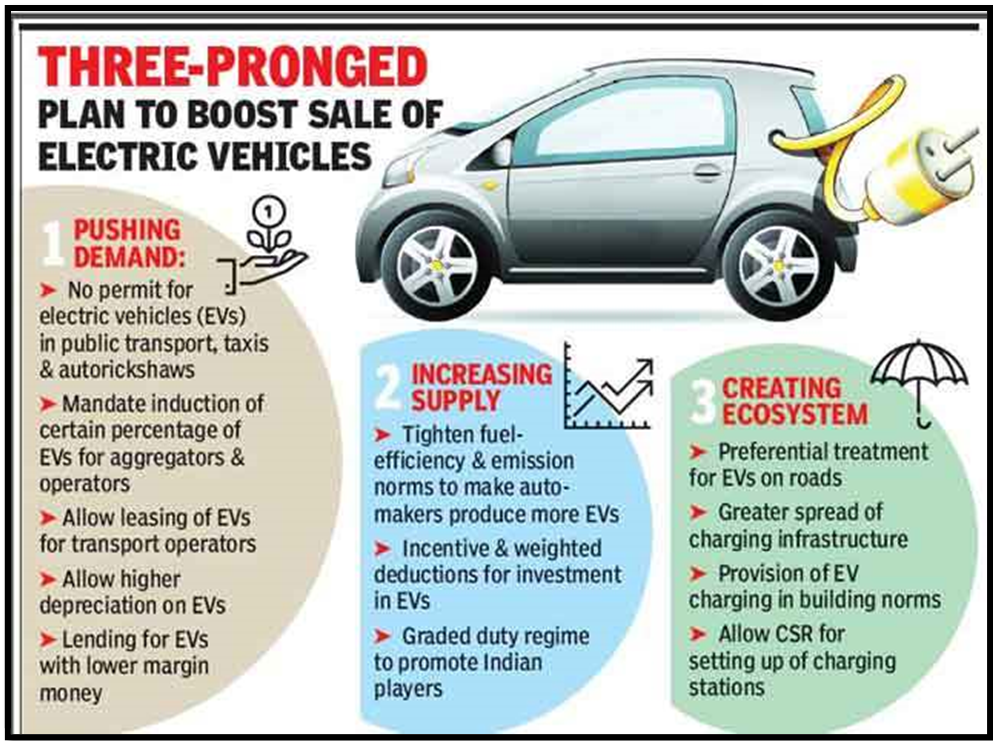HOW IS INDIA PLANNING TO BOOST EV PRODUCTION?
SYLLABUS:
- GS 3 : Achievements of Indians in science & technology; indigenization of technology and developing new technology.
Focus:
- Union government on March 15 approved a policy to promote India as a manufacturing hub for Electric Vehicles (EVs).
India’s Strategy to Boost EV Production
India has set an ambitious goal to become a leader in the electric vehicle market by 2030 with the government laying out a comprehensive roadmap to achieve this goal, which includes several initiatives and policies to accelerate the adoption of electric vehicles in the country. One of the key initiatives is the Faster Adoption and Manufacturing of Hybrid and Electric vehicles (FAME) scheme, which provides subsidies to customers who purchase electric vehicles.
Policy Framework and Incentives:
- India aims to position itself as a global hub for Electric Vehicle (EV) manufacturing, with a minimum investment threshold set at ₹74,150 crore.
- Import duties on electric vehicles imported as Completely Built Units (CBUs) are reduced to 15% for five years, provided these vehicles have a minimum CIF value of $35,000.
- The policy offers a duty waiver totaling ₹6,484 crore on the import of up to 40,000 EVs over the scheme’s duration, with a cap of 8,000 units per year.
- Manufacturers are required to set up local production facilities within three years with localisation targets of 25% by the third year and 50% by the fifth year.
- If the set localisation and minimum investment criteria are not met, manufacturers risk revocation of their bank guarantees.
Domestic Players’ Reaction:
- Tata Motors has expressed concerns that reducing import duties might negatively impact the domestic EV industry and deter future investments.
- Indian firms, primarily leading in lower-priced segments, see limited direct benefits from this policy as it favors higher-end market segments.
- Concerns exist that facilitating entry for global players could undermine domestic manufacturers who are currently not operating at the high end of the market.
- Some industry leaders advocate that policies should incentivize local manufacturing to ensure a balanced competitive environment.
- Calls for a review of the policy to better align with the interests and capabilities of domestic manufacturers, ensuring they are not disadvantaged.
Strategies to Upscale EV Adoption in India
Infrastructure Development:
- There is a significant need for the development of charging infrastructure; estimates suggest India may require up to 13 lakh charging stations by 2030 to support EV uptake.
- Investment in reliable and widespread charging facilities is crucial to alleviate range anxiety among potential EV consumers.
- Government and private sector collaborations are essential to expedite the establishment of a comprehensive EV charging network.
Regulatory and Fiscal Support:
- Enhanced incentives for consumers purchasing EVs can stimulate demand, such as subsidies, tax rebates, and reduced registration fees.
- Policies should focus on reducing the upfront cost of EVs to make them competitive with conventional vehicles.
- Long-term policy stability is necessary to encourage investment in EV technology and infrastructure from both domestic and international players.
Technology and Innovation:
- Support for R&D in EV technology can lead to advancements in battery efficiency, vehicle range, and overall performance, making EVs more appealing.
- Encouraging partnerships between Indian and international firms can lead to technology transfer and faster adaptation to local conditions.
- Localization of manufacturing components not only helps in cost reduction but also in customizing EVs to better suit Indian road and usage conditions.
Public Awareness and Incentives:
- Public awareness campaigns to educate consumers on the benefits of EVs can drive higher adoption rates.
- Incentives for using EVs in public transportation and corporate fleets can set a precedent for broader usage.
- Policies need to ensure that EV adoption aligns with broader environmental goals and sustainability, reflecting the needs of Indian consumers and the geographical diversity of the market.
Initiatives to Foster Electric Vehicle Adoption in India
|
Source:The Hindu
Mains Practice Question:
“Discuss the strategic importance of the new EV policy introduced by the Indian government aimed at transforming India into a global EV manufacturing hub. Critically evaluate the policy’s potential impacts on the domestic automobile sector.”
Associated Articles:
https://universalinstitutions.com/india-to-reduce-ev-import-duty-for-tesla-other-global-automakers/
https://universalinstitutions.com/the-promise-of-hybrid-evs-in-cutting-short-term-carbon-emissions/




